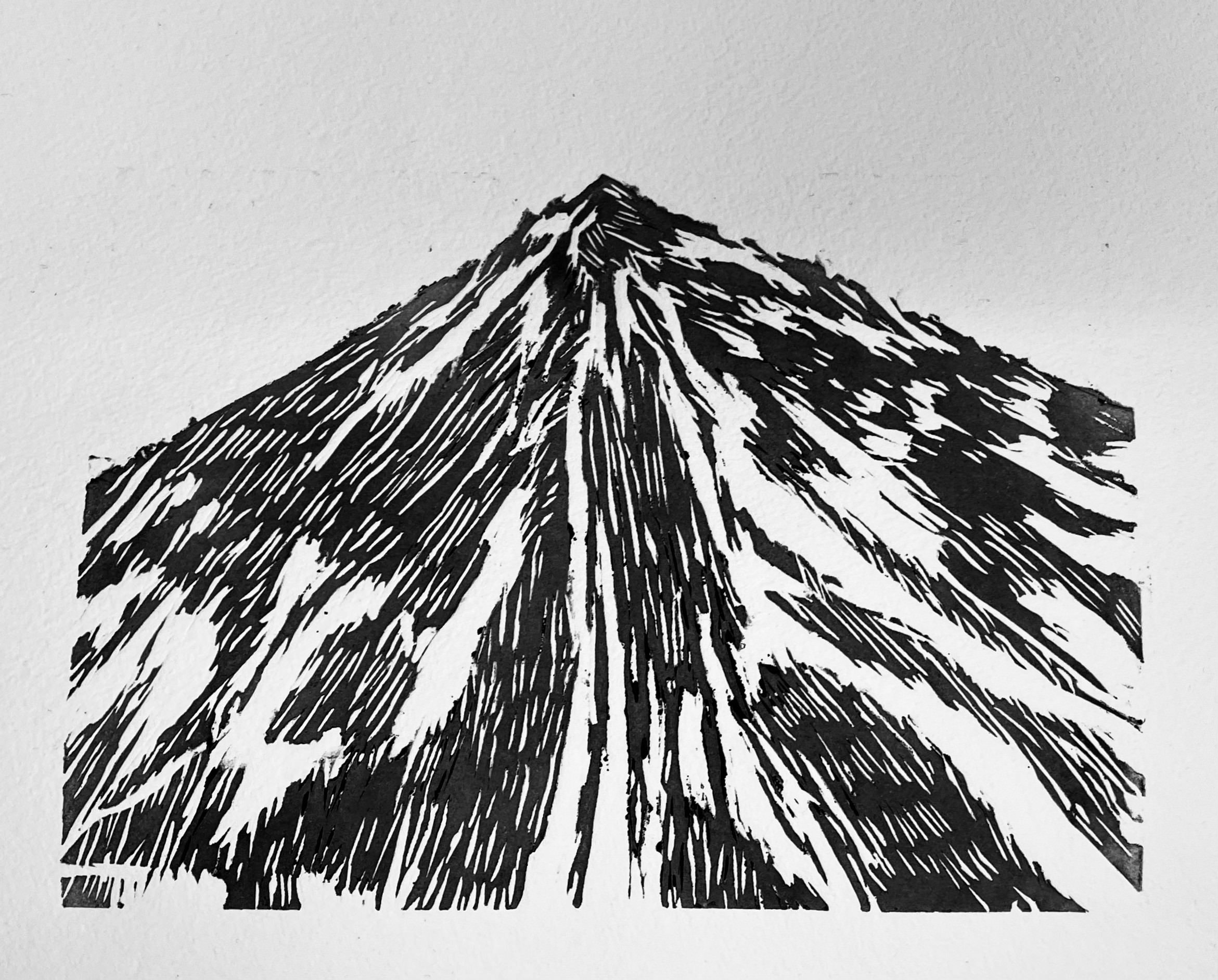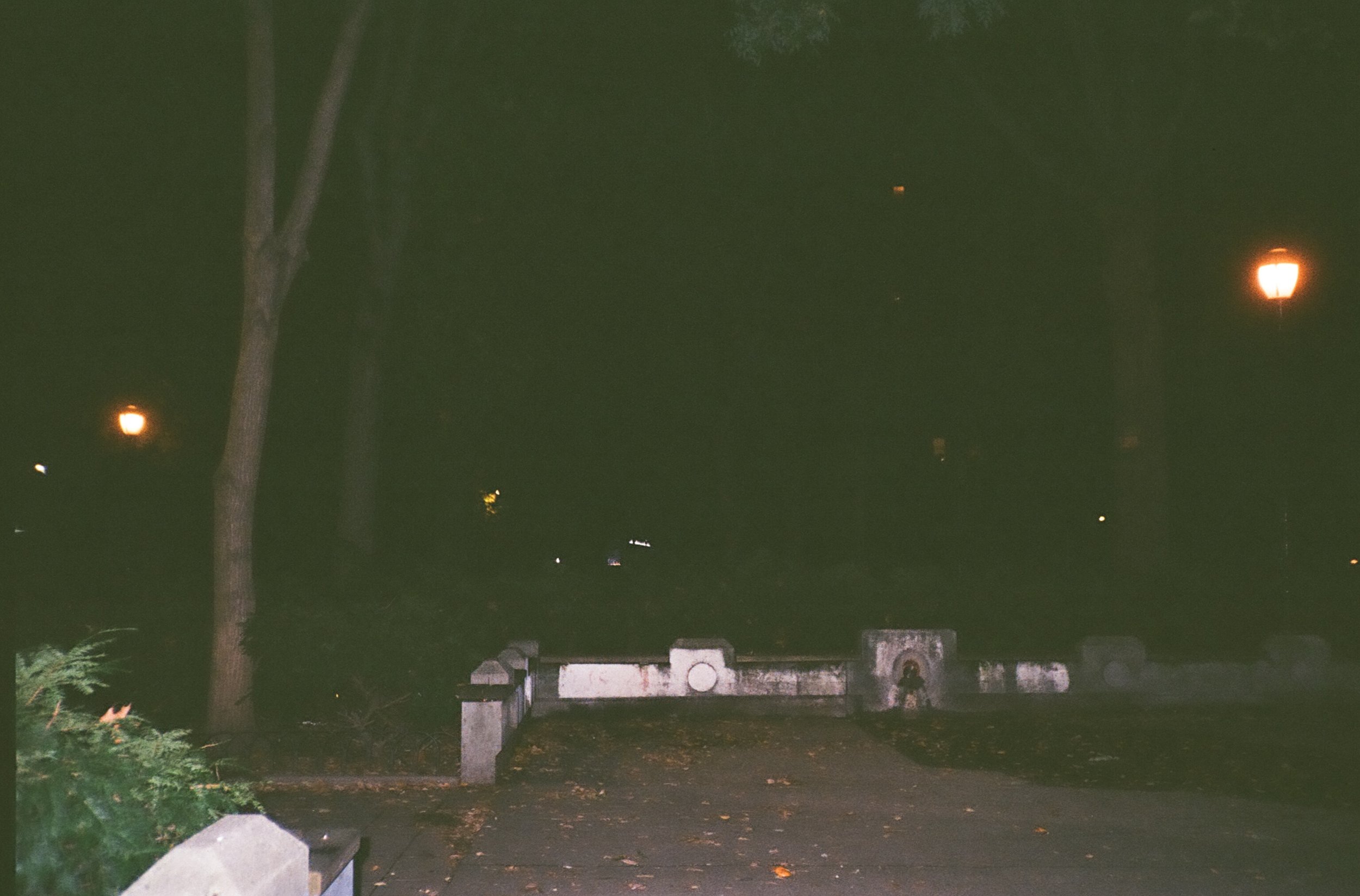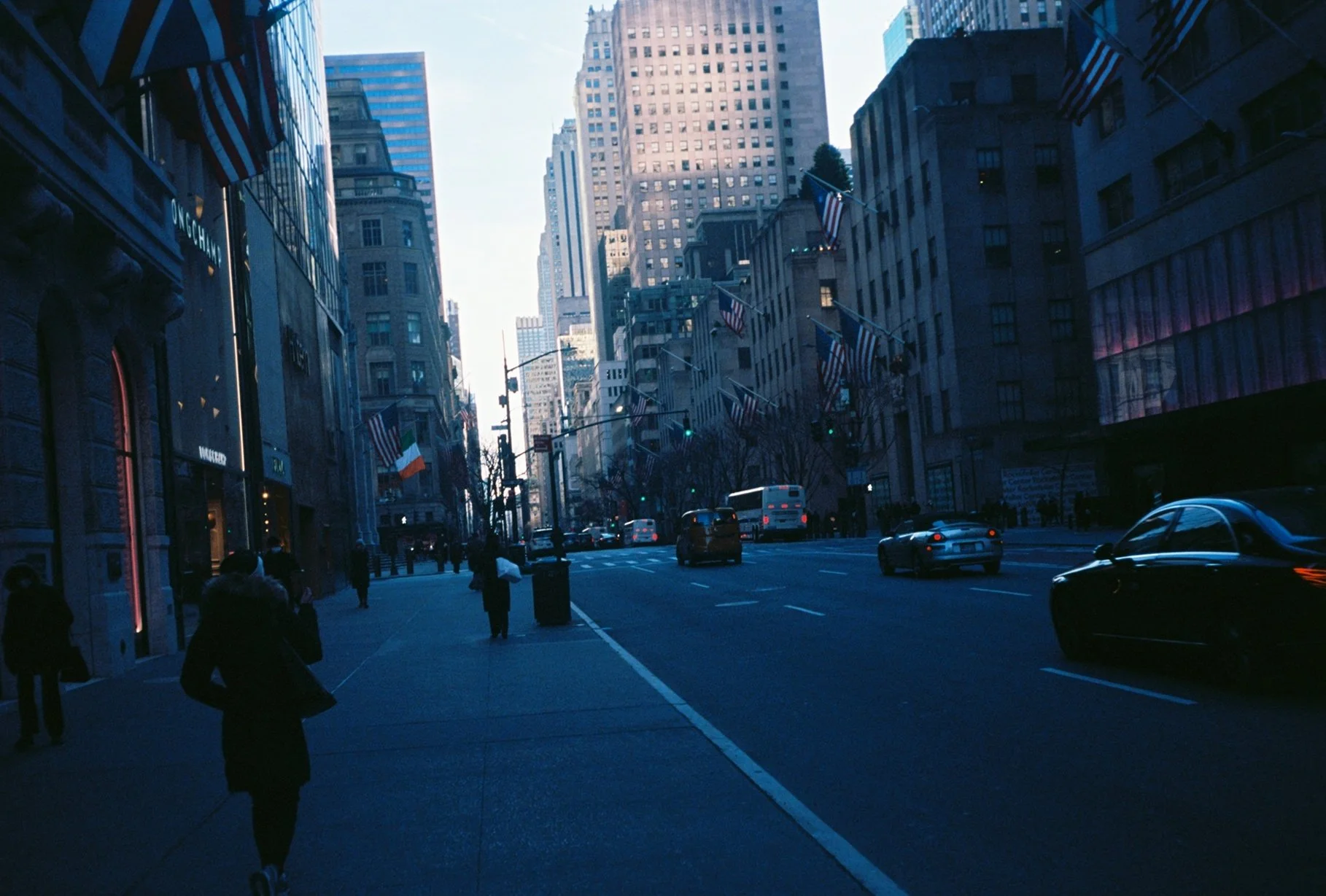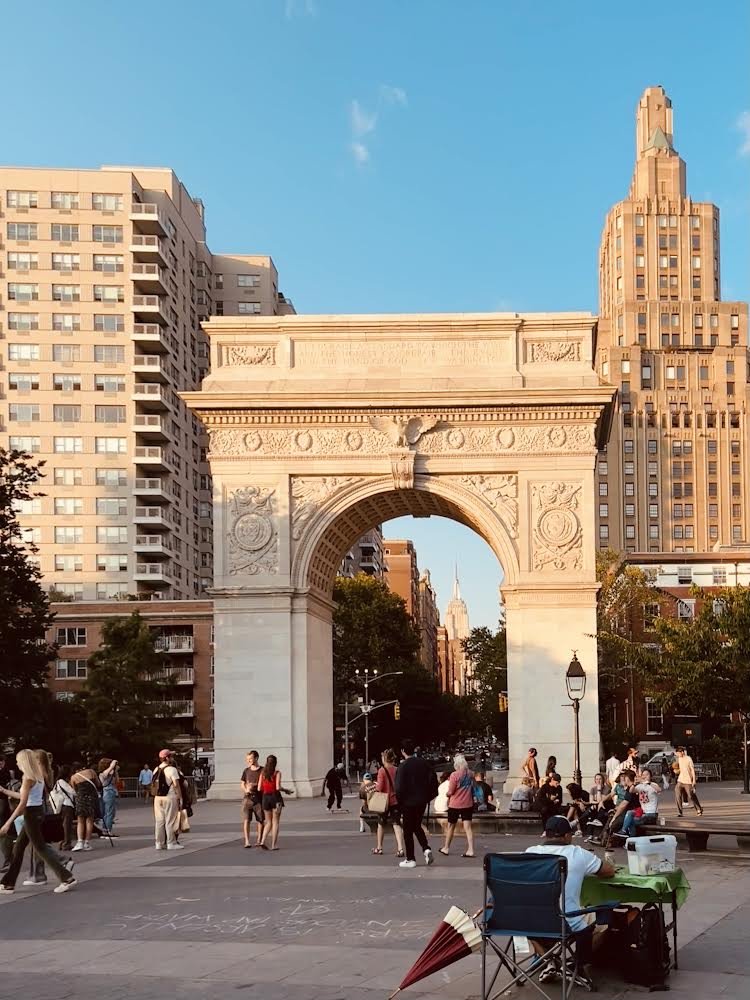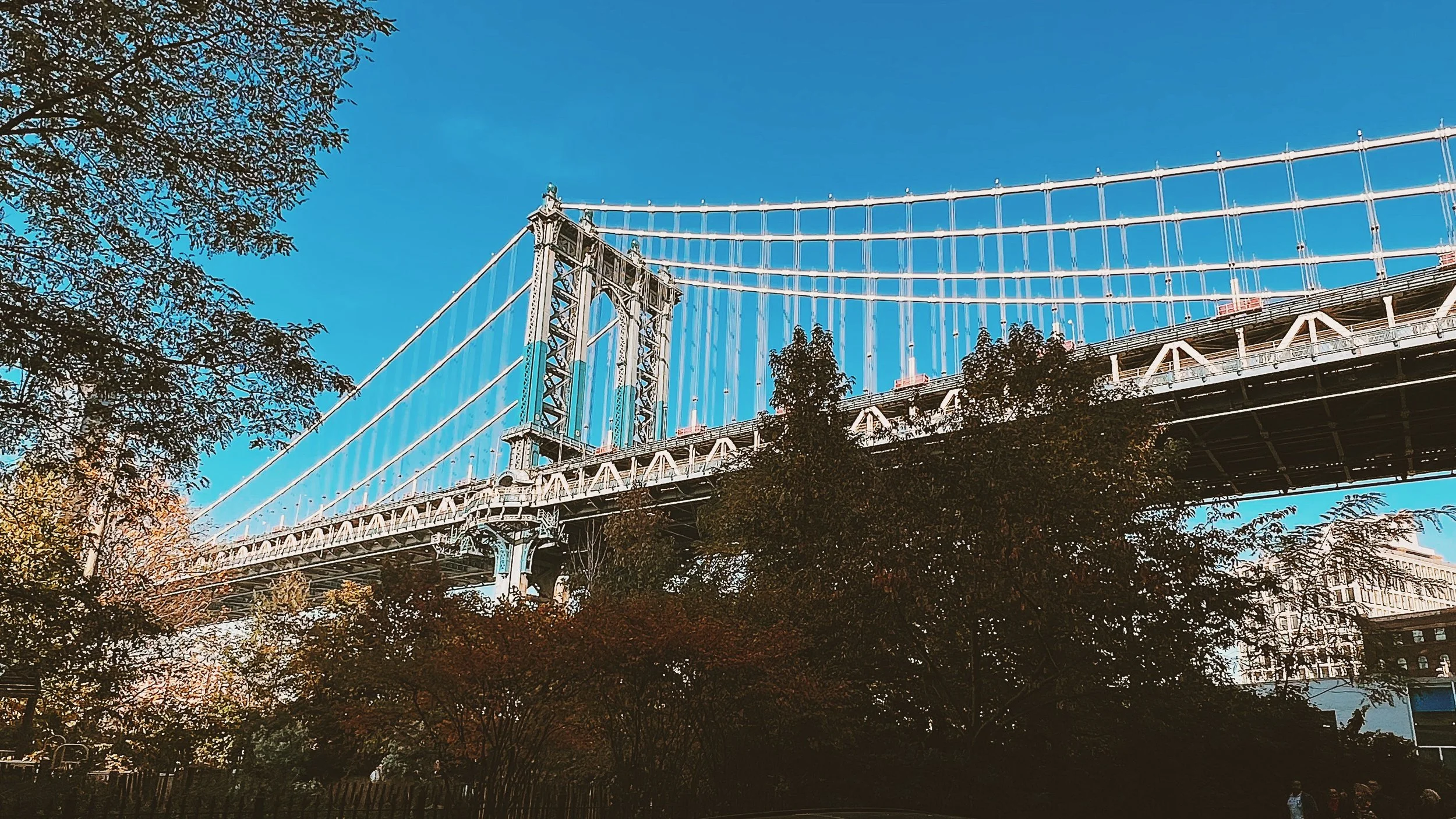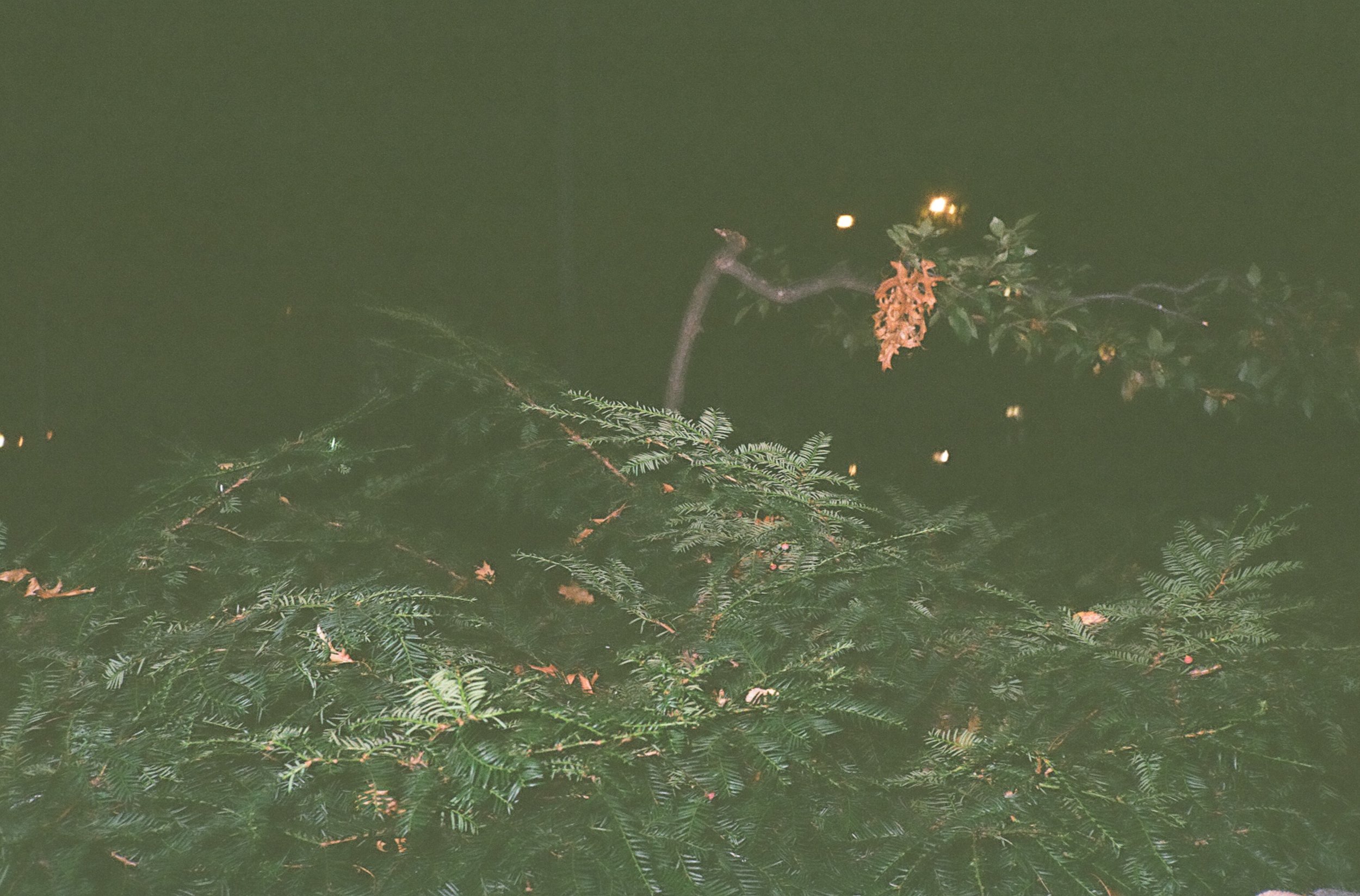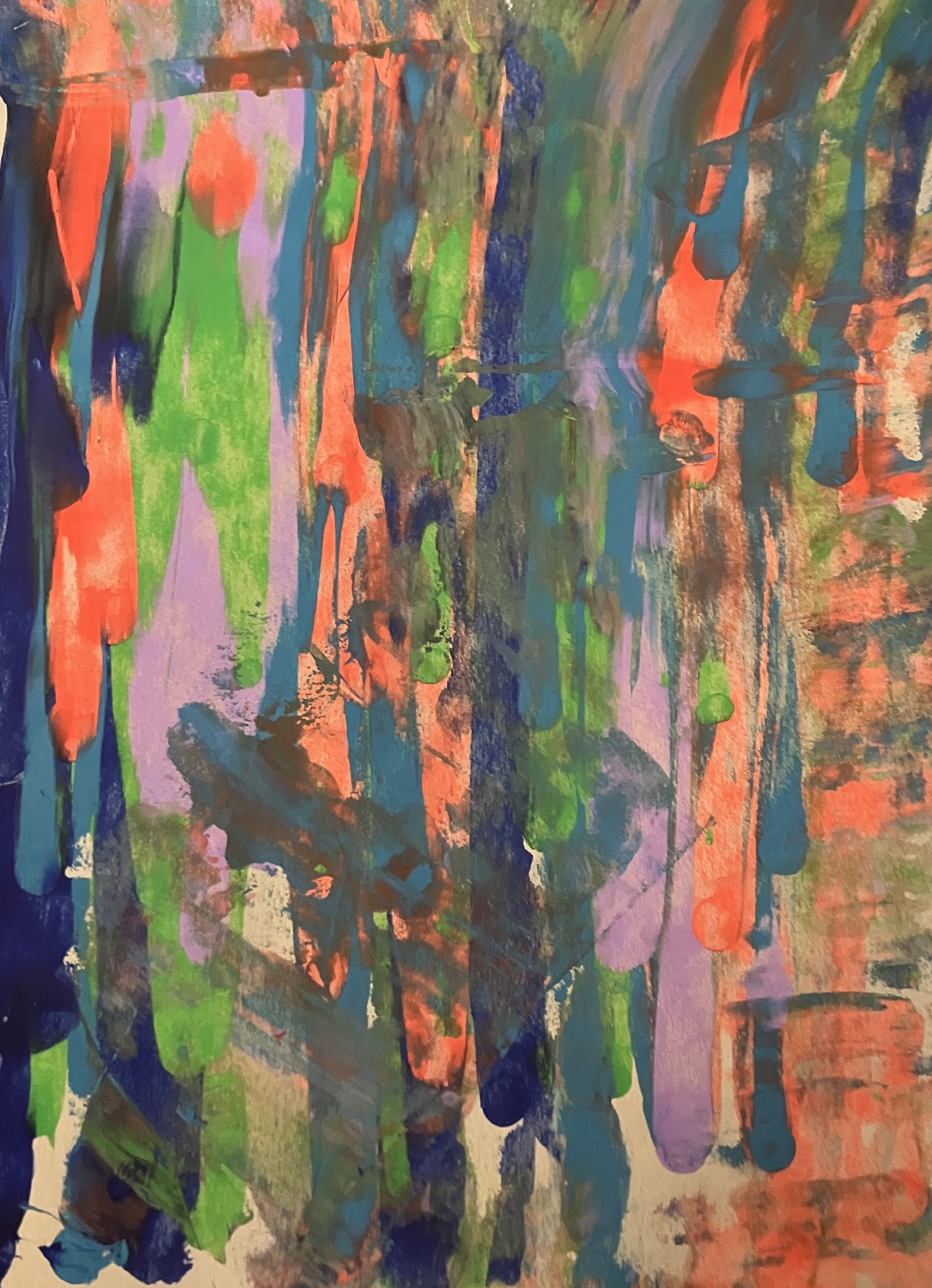October 24, 2023 - Rahil Najafabadi’s “Damavand”
Damavand, Print on paper, 5x5 inches, 2022.
October 22, 2023 - Anna Millard’s “Anya, 1994”
Anya Caronovich did not hear the sirens wailing in Józef Bem Square as police chased down the latest angry young man clutching spray paint, or a can of gasoline and a lighter, raising hell in celebration, or defiance, of all the changes in Poland as it separated itself from the Soviet Union. Passing the Ostrołęka city limits on her bike, she watched ruthlessly efficient concrete apartment complexes dissipate into bare trees and frosted farmland, but did not hear Alexi the fishmonger yelling the price of his fish, or the widow schoolteacher Maryana yelling back that for so many rubles they might as well exhume the jewels from the dead tzar’s fingers. She didn’t hear the last of the Soviet soldiers, gaunt and swimming in their stained khaki-green uniforms, whistle at her as she crossed into her township. Nor her mother in their garden grabbing the cat by the tail to keep it from digging up cabbage. Nor her father in the kitchen in his undershirt despite the snow flurries outside, sweating from drink and swearing at the radio with his fellow unemployed comrade Peter Yuslov. All she heard were the high-octane dance beats in her Walkman. Cyndie Lauper belted over and over again: Oh girls just wanna have —
Anya clutched her coat with one hand to secure the glossy paper stock treasure inside and pushed the door shut against the winter wind with the other, while her father yelled as always “Push! Push!” as though his words any longer made an impact outside his own head. Nikolai Caronavich had been out of work for four years, since the local factory that manufactured wood parts—ironically named Future—shut down, since there would be no more communist funding. “I’m off to the Future!” he used to say, kissing Mama despite her faux protests on his way out the door. Since then, Anya had rarely seen him out of his chair in the kitchen, growing an ever more slovenly beard and grumbling in disapproval at whatever news the radio brought him of the outside world.
“We’ll all die of cold!” Papa grumbled to no one in particular.
Anya answered in slow, thickly accented English as she headed for the creaky staircase, “Daddy, dear, you know, that you are still the number one,”
“What did you say to me?!” yelled her father, who spoke only Polish and Russian. But he remained seated.
Outside it may have been winter in Poland, but in Anya’s room it was always summertime in California. The brightly colored blues, pinks and oranges of ripped-out magazine covers plastered the walls, displaying all her favorites: the Saved by the Bell gang in leotards and torn muscle sweatshirts, the 90210 friends in mini sundresses and v-neck polos, Will Smith in a lime green jumpsuit and striped baseball cap posing with his Fresh Prince of Bel Air family.
Anya leapt onto the bed and unsheathed the precious object she had spent all day biking to the library for, the newest issue of Wow! Magazine. The only teen magazine the library could get past the Iron Curtain, those glossy pages where her monthly portal into her favorite place — America. She didn’t know that Wow! Magazine mainly featured TV actors because they weren’t high profile enough to snag profiles on A-list movie stars. Or that she got the issue three months after it came out stateside. What she did know for certain was that freedom rested in those glossy pages; hope for a world where you were only concerned with want, never need. Wow! was filled with practical advice on the topic of want — How To Make Him Want You. How to Dress For the Job You Want. She felt certain that one day it would include How to Leave Your Family And Move To America.
This issue of Wow! introduced her to a brand new set of attractive buddies to add to her wall; the Friends. The seventeen year old practiced saying the words out loud: Mo-ni-ka, Ră-khel, Shand-lair, Nǖ Yourck.
“Anya, if you want to eat, come downstairs now!” Mama hollered. Anya stuffed the magazine under her pillow and tumbled down.
“What’s for dinner?” asked Peter Yuslov.
“Go home and find out,” Mama retorted. “Anya, Dutchess Olga isn’t laying eggs anymore. Bring her in and I’ll make Paprikasz for tomorrow.”
“But Mama it’s cold!”
Mama raised a wooden spoon in threat, but Anya was already on her way out the door. Complaints were like breath in the Caronovich household — made without forethought or intention to change, just warming the blood against stagnation, which is to say death.
Anya took a moment to consider the chicken’s fate. When she was nine she named their newest bird after the Romanov princess who lived on a farm after escaping the Bulshevicks. She liked the idea that this royal might have lived a similar life to her own. She chased the Duchess for a few minutes, finally grabbing both of her legs against high-pitched howls of protest. In one swift motion Anya dislocated the neck, aiming the blood spatter towards the ground. Perhaps a kind fate for a Romanov.
Anya brought the Duchess’s carcass in for Mama to dress, “You know, if you let me get a job, we could have chicken every night.”
But Mama was adamant, “If there is any real education to be had, my daughter will have it.”
“Do they still make you do vocational years?” Peter asked, “When I was your age, I was at the mining school. I broke two of my fingers down there.”
“All the Russian classes. From twelve to thirteen, I dreamed only in Russian!” Papa added.
“No,” Mama said, “they’re changing everything again. I hear in the city they’re even working with British textbooks.”
“What’s the point of learning there is more to life if you’re too poor to enjoy it?” Anya said under her breath.
“Ignorance is bliss!” Peter Yuslov chimed in, and Mama hit him swiftly with the spoon. “Don’t you have a family of your own to annoy? You pimple on the world’s ass, what do you know of bliss?”
“And you,” she said, pointing the spoon at Anya, “Don’t be so dramatic! You’re starting to sound like your father, whine, whine, whine.”
Papa took a swig of vodka and turned up the radio’s volume in rebuttal. The reporter’s voice echoed, “At the behest of The Church, The Polish Parliament has passed the so-called Anti-Aborion Act, making abortion illegal in all instances except when necessary to save the body of the mother…”
“Turn that damn thing off!” Mama said, reflexively crossing herself at mention of The Church.
Peter Yuslov crept up behind her and tickled her side, “You don’t want to hear about your freedoms? Don’t you care what the feminists say, it is your body and it is your choice?”
Mama laughed from the sneak attack, then caught herself and beat poor Peter to the ground with a force that surprised even her. She collected herself, kissed her cross necklace and went back to plucking handfuls of feathers off Duchess Olga.
“Jesus, and just when I thought I was getting you to crack a smile. It’s always one step forward, two steps back with you.” Peter cradled his bruising side and rejoined Papa. “Get that damn thing to tell me some happy news, why don’t you?”
Papa flipped the knob through static overlay, “For the first time ever, an independent Poland will compete in the Eurovision Song Contest…” he kept searching for a channel.
“WAIT!” Anya screamed so loudly even the cat stopped licking itself and stared. In the early 90’s, Eurovision was like the Olympics, if Olympians wore feathers and sequins and injected way more fun performance enhancers — countries from around the world entered the annual song contest, represented by a single band debuting a new song, and judged each other’s performances. It was the most exciting entertainment spectacle on the planet, known for wild shenanigans on and off stage, plus historic musical feats like the first ever Riverdance and introducing ABBA. And now that Poland was an independent country, she would take her place in entertainment history!
Anya wrestled the radio away from her father and turned the knob frantically in search of the station.
“What’s gotten into you?” her mother inquired sternly, though by this time, stern was the usual tenor of her voice.
“It’s this damn singing contest, making all the youths lose their minds.” Peter explained as Mama relented and plated him an apology potato. “My nephew Oslov and his friend spent all their money on tickets. For three months my sister-in-law hasn’t had a cigarette but Oslov has tickets to this Eurovision.”
That was all Anya needed to hear.
***
Oslov Yuslov was the ugliest boy in the township. His face was pocked with acne marks and he smelled of boiled cabbage. Anya did not think it would be very hard to seduce him, and she was right. As his penis, pink and fleshy like raw chicken, went in and out of her mouth she gagged from the cruciferous smell and let him think it was because he was too large.
To her delight, Anya soon discovered that every troll protects a treasure trove: Oslov had a VHS player. Mama had sold their TV soon after Papa lost his job. Anya went to the library and ordered the first season of FRIENDS. As winter turned to spring, Anya spent every day after school in Oslov’s basement. They developed a routine; first she would give him a blowjob, then after he cleaned up the ejaculate he would give her a bottle of Polo-Cockta, a local Coca Cola imitator, and they would watch an episode of FRIENDS. She studied the actors’ English, repeating the words back at the small screen. As if! How you doin?
Gaining Oslov’s trust proved more difficult than gaining his heart. It took many weeks of hearing about his troubles at school, his plans to make the most of their capitalist future with a business of his own, and his latest attempts to rid his face of acne scars using scalding cabbage water (so that’s where the smell came from!) before he finally told her about Eurovision. He planned to travel nine hours by train to Dublin the first morning of the festival weekend. He would either sleep rough in the train station the night in between, or stay up all night drinking and looking for a leprechaun. He kept his tickets under his pillow.
Anya didn’t plan how she would get the tickets from Oslov — she found that most difficult things in life worked like ringing the neck off a chicken, best not to overthink, your body will know what to do.
Her outfit was another story. If this was her one shot at glamor she wanted to do it right. She poured over her store of Wow! Magazines for inspiration. She focused on the MTV Music Awards red carpets, which she reasoned would be most appropriate for a musical event. After hours of grueling deliberation she narrowed her inspiration down to one picture: Halle Berry in light blue jeans, a black front-tie crop top with long fringe, and a big flower necklace. Red carpet outfits from the 90’s were surprisingly easy to recreate. She skipped school and went to the second-hand store in town, choosing an oversized t-shirt with the least amount of text on it she could find. In the dressing room, she put on a pair of pink platform heels and abandoned her heavy winter boots in their place. Leaving her boots was a big risk, but Anya remembered what Wow! had told her and dressed for the life she wanted. She stuffed the goods into her backpack and ran out, her bike wobbling as she got used to peddling in heels.
Anya waited until her family was asleep to assemble her ensemble. She slashed the shirt above her belly button and used the carnage to slice long strips of fringe. Then she went to work on the flower-patterned cotton sheets that had been on her bed since she left the crib, and her mother’s bed before hers. She cut around the biggest rose, fashioning it into a makeshift choker that tied behind her neck. She felt like God, having created this new person out of the remnants of another.
She heard shuffling downstairs and froze, not wanting to alert her family that she was up so late on a school night. She tiptoed over to her door, opening it carefully to better eavesdrop on the midnight intruders. Sounds like piles of wet fish slapping around in Alexi the monger’s cart — kissing! Peter Yuslov attempted a whisper, “We can’t keep living this way. Something has to change.” Then a silence so loud Anya feared it would wake the rooster early. Finally, Mama’s gruff reply, “You think what we’re doing isn’t violence because it feels good? Just look at the world — good or bad, doesn’t matter, all change is violent. We would rip our families apart.”
Anya quietly shut the door. She pictured herself as Mama, wearing heavy wool skirts from the 60’s, stuck in a miserable marriage, working herself to the bone to maintain a sense of stillness in a country that kept shoving her here and there and here again. She wouldn’t survive that kind of life. Anya looked at herself in the mirror. She didn’t look like Halle Berry. She looked like a string bean of a girl wearing a cut up shirt and new heels. But still, there was someone special there. Why Halle Berry and not her? Why couldn’t she have a life filled with things that made it worth living? Even if it took a little violence to get there.
***
At exactly 3:15AM, Anya threw a rock at the ground-floor window of Oslov’s bedroom. Early enough that everyone would still be asleep, but late enough that she could make the dawn train before being caught. He opened the window and she climbed in.
“I just couldn’t let you go without saying goodbye,” she trilled, batting her eyelashes. “Why is your shirt all torn up?” he mumbled with sleep in his eyes.
“Why are you wearing striped pajamas like a little boy?” she snapped back. Oslov looked down at his sleep set, “My mama bought them for me!”
Anya rolled her eyes, “Are we doing this or what?”
“Hold up, let me pee first,” he said, shuffling downstairs to the toilet.
Anya dug her hand under his polyester pillow. But the tickets weren’t there. She scoured his dresser, dug through the mound of dirty clothes on the floor of his closet; nothing. When Oslov came back up she saw them dangling out of the pocket of his pajamas. After all the times Anya burned her finger boiling cabbage for him, the bastard still didn’t trust her! She would need to get his pants down.
Anya slinked over to Oslov and began their usual routine. He took his penis out of his pajama slit and she knelt for a better angle. When he closed his eyes, she reached for the tickets. She carefully guided them out, and almost made it unnoticed, but for a wave of pleasure that made his leg twitch, causing her arm to jerk and his eyes to open. “What the hell?!” He snatched for the tickets and Anya’s body took over — she bit down, hard.
Anya didn’t want to get blood on her outfit. She ripped out a page from the copy of Wow! she had in her backpack for entertainment on the train ride, and clutched the shriveled stump with it. “It’s just a tiny piece, don’t be so dramatic.”
Oslov roared curses, called her a bitch, but he couldn’t get off his knees. He screamed, trying to stop the spraying blood. She heard his parents waking up downstairs and grabbed the tickets, being careful to put them in the opposite coat pocket from the gorey tip. She went out the same window she came in, turning to take one last look at Oslov. Before jumping down, she thought he looked beautiful this way, red in the face, punching at the air, more animated and alive than he had been for the months she had been sucking his cock. If he showed this much charisma before, then perhaps — but there was no time. Anya sped on her bike to the train station. She felt sure his parents would be too distracted with getting Oslov to the hospital to think about calling the police before the 5AM train. Whether or not she was right in that assumption, she made it on the train uninhibited and sped towards Eurovision just as the sun began to rise on an independent Poland.
***
Anya heard ten different languages in the first ten minutes after stepping off the train in Dublin. The city was charming, with cobblestone streets and multi-colored town houses and pubs with big red windows and festive lights strewn about just for ambiance. It was chock full of people, people she had never seen before — with ski-slope noses and white-blonde hair, or jet black curls and dark olive skin, or pleated braids down to their asses and gages that pulled their ears to nearly shoulder length. People from around the globe had gathered, laughing, drinking and meeting each other in advance of the festival. It was a stark difference from the homogeneity she was used to, with Soviet-era concrete everything and people who all looked like cousins.
After walking ten minutes from the train station to escape the biggest crowds, she shifted the weight to her hip and spoke the universal language of hitchhikers: outstretched arm, thumb up. Car after car sped by, and she wondered if this is what the earth’s core felt like — the center of the action, the whole world spinning around you, yet standing completely still. Finally a group of men with shaggy hair and leather jackets stopped the yellow and white striped school bus they were using as a tour bus while in Ireland.
“No!” the gangly manager cried, positioning his arm like a police barrier, “No! Not after what happened in Denmark, we are NOT stopping for hitchhikers!”
Anya was about to meet her first real-life American.
A musician in need of a haircut looked undisturbed, his words pouring out thick and sweet like custard dripping from the Paczki donuts Anya ate for breakfast on her birthday, “Jasper, baby, this is nothing like last time. Scout’s honor, I’m on the wagon! No drugs while we’re in Dublin. I’ve learned my lesson. And look at her, just look at her. She couldn’t hurt a fly.” The musician winked at Anya.
Anya knew few of the English words they were saying, but easily understood the scenario as a whole: the instruments in the backseat, No!, an arm barrier, the look of a lying man, a wink. The musician held out his hand like a gentleman in a romance movie and she curtsied in return before letting him lead her to the bus.
The shaggy man’s name was Greg; he played the bass and did backup vocals in an up-and-coming band called Angelic Hellfire. He introduced her to the motley crew of characters onboard: the drummer calmly puffing a joint, the charismatic lead singer with oily skin, their ever-fretting manager. There were also a few women on the bus: the drummer’s wife with an infant suckling at her bare breast, and two other young girls who shared the wide-eyed expression of someone paying close attention through a language barrier.
“I think Michelle is from the same place as you, right Shell?” A redhead greeted her excitedly in Russian and Anya quickly cut her off in Polish. For a moment both women stared at each other in silence. Decades of dead men, revolution, bread lines, ideological politics, secret police, more dead men and another revolution filled the six inches between them. But to the Americans, they sounded the same. “See, a little bit of home here on the Emerald Isle!” Greg took a jaunty swig from a bottle of whiskey and handed it to Michelle who drank after him. She carefully offered the bottle to Anya, her eyes extending a deeper, unspoken offer. Anya nodded in acceptance, took the bottle and mixed spit with a people her father called The Occupiers. Both girls smiled. They came here to free themselves of their hometowns, to start a future unencumbered by the past. “Yes, home.” Anya said in English and Greg smiled, throwing an arm around her.
For the next three days Anya stayed in the band’s hostel — they split three private rooms in a Victorian-era brick building that smelled like bitter barley and history — doing drugs with the other groupies and fucking Greg to sleep at night. She thought it should have taken longer to adapt to such a big change, but she grew up in a changing world, the invention of the internet, the breaking up of world powers, first kisses and growing breasts all got equal weight in her adolescence. She began to think of these people as her family, roaming artists who understood the divine power of pleasure.
High on pot and oxy and cheap rye whiskey, Anya looked at herself naked in the hotel mirror, running her fingers through her pubic hair and over the soft parts of her body that curved like the globe. She had never given her body much thought before. At best, she had seen it as a useful thing, a tool for peddling bikes and carrying magazines. At worst, it was a source of pain, of bleeding that needed to be stuffed each month like a wound that refused to heal. But now for the first time she considered her body as a source of joy. Of course the earth is a woman, she thought. I am so lucky to be a woman. A man would have come to Dublin with money, sure — but money can be stolen. So easily a man could find himself at the mercy of the cold and the wind, begging from strangers with nothing to barter in return. But she would always have her body as currency in this world. Her dimpled smile and her long hair and her soft, soft skin. That could never be stolen. Borrowed, sure. Depreciated? Eventually. But stolen? Never.
On her third day in Dublin it was finally Poland’s turn to compete in the song contest. Angelic Hellfire had planned to skip this one, but Anya convinced Greg and the groupies to join her, and the lead singer always followed the blonde Danish groupie. They announced the Polish representative and their little patchwork family cheered wildly.
The lights went down and a hush fell over the audience. Edyta Gorniak walked on stage slowly. She was thin but strong in a sleek white satin gown, and Anya thought she looked like an angel. As strings began to swell it became clear this would be a different kind of song, not one of the dancy pop numbers Anya and her counterparts were expecting.
Edyta crooned gently with a piercing voice that wavered occasionally with emotion. She pleaded over and over for the world to realize she is not Eve, that she should be loved instead of punished for the circumstances of her birth. She described two worlds: the colorful, happy lives in romance novels, and the misery of people in the black and white newspaper. And her? A paper puppet, wanting to act, wanting to take flight.
For three minutes and twenty four seconds the earth stopped spinning. Somewhere in a little town outside Ostrołęka a chicken suspended its egg mid-lay. Anya, who had not shed a tear in all the carnage and chaos of the past week, began to weep openly.
She looked at the strung out, drunk fools around her who had seemed so shiny just minutes ago. They were sort of half paying attention, flirting with one another or searching for gum in their pockets, waiting politely for the next song in English. They claimed to be artists, but these people didn’t feel anything, not really. For them all of this was just a good time; for her it was deadly serious. She had abandoned her family and risked incarceration for a chance to live a life that included the colorful joys of Eurovision. The lyrics in her native tongue pierced a piece of her soul the way a perfect song can when you’re seventeen. She, too, wanted to leap off the page and choose her own ending. To ascend the earth; fly above the politics and the hunger and the men who never changed. This was a freedom worth fighting for.
Michelle came forward in the silence and took Anya’s hand. She cleaned tear-smeared mascara off the edges of her eyes with her fingers. Neither spoke a word until Edya finished singing. And then, covered by the noise of the crowd’s applause, Michelle whispered in Anya’s ear in half-English half-Russian, “You must come to New York. Greg always thinks he is in love when he does ecstasy. They leave tomorrow. You have to come to New York with me.” Michelle took a piece of tin foil out of her pocket with one hand and kept Anya in the other, offering both to Greg.
Greg opened the foil, “What a treat! What a perfect way to spend our last night in Europe.”
Two hours later, all their bodies were hot and strewn across each other like tangled Christmas tree lights. Greg put his head on her lap and she stroked his hair as he told her many secrets she understood the feelings of, if not the words. Outside, thunder clapped and the crew watched the downpour beat against their hotel window with the attention of an Oscar-winning film.
As the rain started to pour, she said the only English words that felt right in that moment, “I’ll be there for you.”
George’s pupils pooled his eyes, “Wow. Do you really mean that?”
Anya nodded. “Take me. New York. Central Perk.”
He grabbed her hand, “Yes! Let’s run away together! We can get married in Central Park! My tour is leaving — ”
“Yes! I fly with you.”
“You want to come on tour with me?”
“Yes, we go, New York, yes.”
“I’ve never met anyone who gets me like you do,” he kissed her deeply and yelled for Jasper to handle the ticket.
***
On the plane the band settled into business class; Anya sat in coach with the groupies and the drummer’s wife. It was her first time flying.
As the plane began ascending, Anya felt her heart plunge into her stomach and thought she was going to shit it out. What was she doing? She didn’t know anyone in New York. Greg hadn’t spoken to her since he came down from the ecstasy. Michelle grabbed her hand as they hit turbulence. Anya squeezed her back, noticing her new friend had flat nail beds like Mama’s. She smiled.
When Michelle fell asleep, Anya reached into her pocket. She carefully unwrapped the wrinkled nub of flesh that was once attached to Oslov. On the page, an article called Summer Travel Tips was drenched in dark dried blood. Perhaps Mama was right; this souvenir was her testimony that change is necessarily a violent act.
Two months later, Michelle picked up Anya from the clinic in Queens. They put her out for the D&C so the procedure didn’t hurt, it was just scary. She had some cramping, but felt fine a few hours later and the nurses okayed her to leave. Anya was surprised at how quickly she felt like the whole ordeal — throwing up in Michelle’s apartment at 2AM, stealing the pregnancy test from the drug store, haranguing George’s anxious band manager until he gave her money for the procedure — had never happened.
She and Michelle got jobs as waitresses at a restaurant in Greenpoint where the owner spoke Polish. She spent most of her time with the immigrant families there, in a quiet pocket of Brooklyn by the river where children threw bread at birds and everyone rode bikes. Sometimes a woman would yell at a child in Polish and Anya would turn around expecting to see her own mama waving a wooden spoon. She liked working at the restaurant where people thought her heavy accent made the place “authentic.” She made enough in tips to keep paying Michelle’s roommates to let her sleep on their couch in the East Village, which reminded her of the romantic bustle of Dublin, but much more loud and dirty. It never ceased to surprise her how many different things New York could be all at the same time. The apartment was like a hostel; the roommates were all fresh in from different corners of the world and none of the ladies spoke the same language fluently, though Russian and Polish shared many words. They agreed the apartment would be English-only, so they were all on the same footing, working through this new language and life together like the Friends they obsessed over.
That night the girls curled up in Michelle’s bed and turned on the TV. Michelle held Anya’s hand. Anya didn’t know it yet, but so much of her life would be decided by the comforting homeland of that soft hand.
“Monica all the time being so serious,” Anya said rolling her eyes, “But at least she has real job as head cook. And nice brother. And very very skinny. I think she will be success. Most success of all Friends.”
“You are Rachel,” Michelle said, squeezing her playfully, “Crazy hair but the boys love you.”
“You are Phoebe. Musical and always making jokes.”
“Musical?”
“Well, you like musicians.”
“We just need a Monica and we will be complete.”
“I love you. Promise not to ever leave me?”
“Yes, of course. Rachel cannot live alone.”
“No, Rachel would die alone. She cannot make coffee even.”
“Phoebe also is too crazy, she needs Rachel.”
“Phoebe needs Rachel.”
***
On their last night in New York, after the nine months it took to save up for plane tickets to move in with Michelle’s family in Pittsburgh where they could each have their own beds, the girls pooled their tips from the week and treated themselves to a lavish dinner at Union Square Cafe. They borrowed clothes from Michelle’s cousin and dressed to impress, pulling out all the stops with bright blue eyeshadow, two pink feather boas and the high platform heels Anya hadn’t worn since Eurovision. The restaurant was full of people who regularly paid $500 for meals; mostly older men and women with white hair and tailored suits, or younger adults who could be their offspring in imported cashmere sweaters and gold brooches. On her third vodka martini, Anya understood, just for a moment, why her home country had been so desperate for capitalism. These people could look down on them all they wanted, but their money spent just as well. A runaway waitress, slurping a lobster with her gorgeous, fun friend in the best restaurant in the world — this was freedom.
When Michelle went to the restroom, one of the white haired men approached her and asked, “How much for the night?” Anya considered the proposition, but remembered she was on her period. She looked him dead in the eyes and unblinkingly asked, “Are you scared of blood?” The man seemed to think she was threatening him and slinked away.
“What did you say to scare that man?” Michelle asked, slumping back into her seat. “Americans are so silly. They think just because it is served on a gold plate, their chicken can be killed without blood.”
The girls laughed, throwing their boas around their necks, and ordered another round of martinis. There would be many years ahead for bending against the gravity of the world’s hard lessons, for steel mills that never reopened and men who sounded too much like their fathers and a daughter named Monica who would go to great lengths to look like someone who did not look like them. But on one sunny New York day when they were eighteen, the martinis were strong and the world spun just for them.
Anna Millard is a fiction MFA candidate at the University of Pittsburgh where she is finishing a satiric novel about new media in New York, and where she teaches Seminar in Composition. She won the 2023 Nordan-Kinder Award in Fiction and placed in The Dillydoun Review International Fiction Contest 2021. Her fiction has been published in The Dillydoun Review, Curlew New York and Alloy Magazine. She's also written for The Bushwick Daily and Refinery29.
October 21, 2023 - Rahil Najafabadi’s “Nocturnal Ending”
There’s something disturbing me about the paradox
after midnight. Anything is fine when the sun is still here,
when the lights don’t need to be on, and when I overlook
shadows. Why does it all turn into fear when it happens
if everyone is asleep? Like a child’s laughter, I too feel
something in the dark. Being locked in while my shower’s
running. If the moonlight flickered and kept my sheep
awake, where will I go in search of a bed, where the world
sleeps when I do too. I cannot escape every mirror that
looks back at me––the ballerinas in my jewelry boxes
turn their heads and try to question why I stay awake.
Dream with your eyes open through the night, and everything
can talk. None of them will tell you why you’re alone,
none of them know what will put you back to sleep.
October 20, 2023 - Elizabeth Lerman’s “It’s hard to get used to something in your sleep”
A plane pulls up to the platform and you are meant to get on it. You don’t remember buying a ticket but you’re running late and everyone is already there waiting for you. Inside the seats are all wrong, facing one another like they do underground because here, the airport is a subway stop below the mall where you go to see movies, and the whole place shakes when the planes come in and sometimes you stay there, in the hotel beside the mall above the museum where there is a new exhibit every night, and you always pray it won’t be immersive because those are a whole new hell, a haunted house you have to get through before bed and you just want to be safe somewhere, to breathe deep without the backdrop of dread but by the time you make it upstairs, it doesn’t feel right anymore. It’s hard to get used to something in your sleep. You are always locked out, and even when you find a way in, it’s like you are sneaking through someone else’s space, heavy with the feeling that it had just been yours. You might live there but it is never really home.
October 17, 2023 - Aditi Bhattacharjee’s “Afternoon at the park”
Aditi Bhattacharjee is an Indian writer, currently pursuing an MFA in Writing from The New School. Her work has appeared in Lunch Ticket, Evocations Review, Vagabond City Lit, The Remnant Archive and elsewhere. In her spare time she likes people-watching and city-chronicling.
October 15, 2023 - Rahil Najafabadi’s “Sentimental”
No breeze is a whisper between the trees,
the silence between the footsteps of us following
worse mistakes. Like the repetition of a pointless
battle, a bitter heartbreak that has kept my thought
of days becoming eager for tomorrow brittle. The
candle of each lover burns more of my own brightness,
I can’t see if I’m not seeing with another person.
Again, there’s another kiss of winter that’s sealing me,
I have nowhere to go but to feel something that’ll
take away the coldness even in the presence of the sun.
October 14, 2023 - Rachel Coyne’s “Dissolution”
Rachel Coyne is a writer and painter from Lindstrom, Mn
October 13, 2023 - Aditi Bhattacharjee’s “No bridge long enough”
Aditi Bhattacharjee is an Indian writer, currently pursuing an MFA in Writing from The New School. Her work has appeared in Lunch Ticket, Evocations Review, Vagabond City Lit, The Remnant Archive and elsewhere. In her spare time she likes people-watching and city-chronicling.
October 10, 2023 - Aditi Bhattacharjee’s “Cohabitation”
Aditi Bhattacharjee is an Indian writer, currently pursuing an MFA in Writing from The New School. Her work has appeared in Lunch Ticket, Evocations Review, Vagabond City Lit, The Remnant Archive and elsewhere. In her spare time she likes people-watching and city-chronicling.
October 8, 2023 - Rahil Najafabadi’s “Tomorrow is Hope”
When all the boats grow smaller and the river
takes them to another lover patient on the dock,
perhaps I’ll walk away and lay down on the grass.
The lover’s eyes are embroidered on the riverbank
and it’s spread of blooming remain. He awaits a bottle,
he doesn’t know an army of young people and dead fish
are coming instead. Maybe tomorrow, or years later,
that bottle will be pulled by someone who breaks it.
My letters have ended up torn, but never soaked
in nature’s ground for sorrow. My destiny was there,
caged in a small town or a free land under dictatorship.
I sprung out of the dark trees because I heard, flowers
might bloom. I walked on a future bouquet and ground zeroes,
but life was what escaped me––That love bottle eluded me.
Tomorrow is hope, not a promise, but a flower that may bloom.
October 7, 2023 - Rachel Coyne’s “Broken wheel”
Rachel Coyne is a writer and painter from Lindstrom, Mn
October 6, 2023 - Elizabeth Lerman’s “When the wind blows this way”
I feel my loneliest in fall and still, it is my favorite season. My stomach drops because the weather is changing and, usually, so is everything else, and when the wind blows this way I want to be held by someone who hasn’t hurt me yet but the thought of another new thing makes me hide and say maybe some other time because tonight, the October air pulls me close and I use the dog as a reason to keep walking, wanting to be outside with some purpose, and she is ready to go in before I am but I turn again, trick her into a few more blocks, so that by the time we get home I am happy and aching for it.
October 5, 2023 - Aditi Bhattacharjee’s “The date”
Aditi Bhattacharjee is an Indian writer, currently pursuing an MFA in Writing from The New School. Her work has appeared in Lunch Ticket, Evocations Review, Vagabond City Lit, The Remnant Archive and elsewhere. In her spare time she likes people-watching and city-chronicling.
October 4, 2023 - Aditi Bhattacharjee’s “A promising future”
Aditi Bhattacharjee is an Indian writer, currently pursuing an MFA in Writing from The New School. Her work has appeared in Lunch Ticket, Evocations Review, Vagabond City Lit, The Remnant Archive and elsewhere. In her spare time she likes people-watching and city-chronicling.


